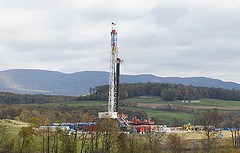This month, the Penn State Marcellus Education Team will hold two webinars on liquefied natural gas and world oil and gas resources.
On May 8, the topic will focus on LNG. In 2013, the United States produced more than 24.2 trillion cubic feet of natural gas. With the continued increase in natural gas production, more talk has turned to exporting it in the form of LNG.
From 1 p.m. – 2 p.m. May 8, Sugandha Tuladhar, vice president of NERA Economic Consulting (NERA) will participate in a special webinar to discuss the results of a new study, “Updated Macroeconomic Impacts of LNG Exports from the United States.”
It is an update to the study of the macroeconomic impacts of LNG export that was issued by the U.S. Department of Energy (DOE) in December of 2012. The new study responds to several issues raised since the first study, including use of current data, cumulative impacts of additional license approvals, impacts on the competitiveness of the U.S. chemicals industry and impacts of LNG exports on employment.
The study addresses 63 scenarios for potential LNG exports, looking at a mix of assumptions relating to U.S. natural gas supply, the international supply and demand, and the future capacity and rate of growth of U.S. LNG exports.
Tuladhar states, “LNG exports from the United States provide net economic benefits in all the scenarios we investigated, and the greater the level of exports, the greater the benefits.”
On May 15, world oil and gas resources, consumption and new trends will be explored in a webinar. Energy plays a major role in everyday life, in business and in national and international relations. Understanding the economic relationships of world energy resources and consumption and what is on the horizon is important in understanding local and global situations.
Aloulou Fawzi, kndustry economist and project manager of exploration and production team, with Energy Information Administration (EIA) at the U.S. Department of Energy will discuss some of these energy resources and use. Fawzi will present, “World Oil and Gas Resources, Consumption, and New Trends According to U.S. EIA” on May 15 from 1 p.m. – 2 p.m.
EIA collects, analyzes and disseminates a wide range of energy information and data covering all aspects of production, supply, demand, imports, exports and pricing to help promote sound policymaking, efficient markets, and public understanding of energy and its interaction with the economy and environment. Fawzi will share some of this current information regarding world oil and gas resources and use.
Penn State Extension’s Marcellus Education Team provides monthly webinars on a variety of topics. Upcoming webinars for 2014 include:
June 19, “Utica/Pt. Pleasant – Where are We at Now?”, Manuj Nikhanj, managing director, head of Energy Research, ITG Investment Research
July 17, “Industry Workforce and Training,” Penn College of Technology and state Department of Labor and Industry
Aug. 21, “Natural Gas Processing and Effects on Royalty Income Streams,” Steven M. Karabin, PNGE, RL, president and chief executive officer, The Rhino Group
While free, registrations for the webinars are necessary, and all can go to the Penn State Extension Natural Gas Events page to find out more information for each upcoming webinar. It is important that all who register provide an e-mail address in order to receive the link for the upcoming webinar. For more information, contact Carol Loveland at 570-320-4429 or by email at cal24@psu.edu.
Previous webinars, publications and information also are available on the Penn State Extension natural-gas Web site covering a variety of topics such as Act 13, seismic testing, air pollution from gas development; water use and quality; natural gas liquids regional development, natural gas reserves; gas-leasing considerations for landowners; legal issues surrounding gas development; and the impact of Marcellus gas development on forestland.
